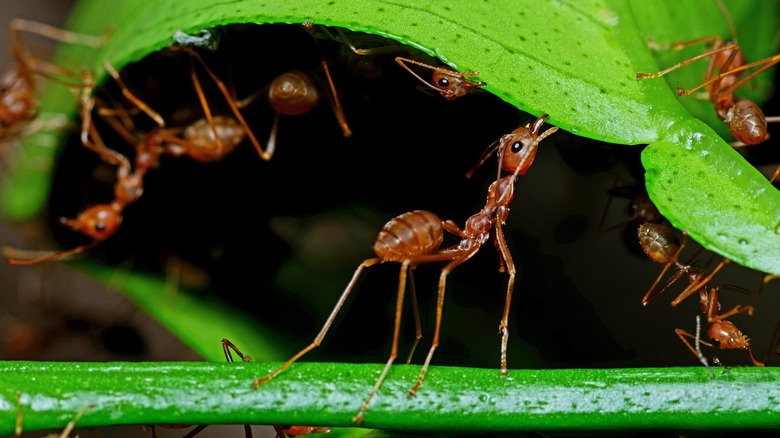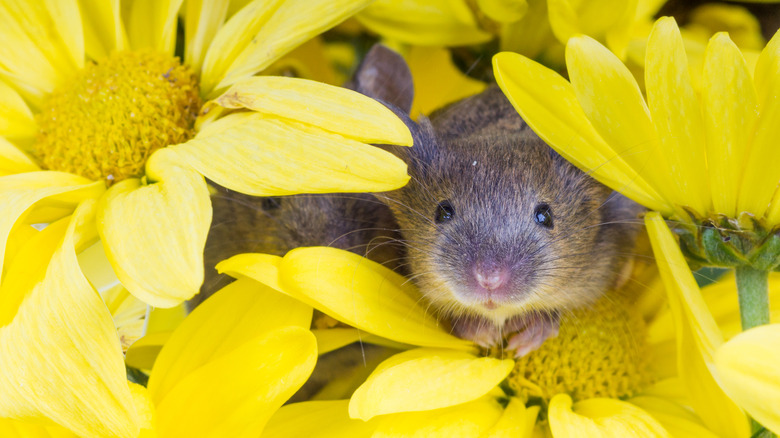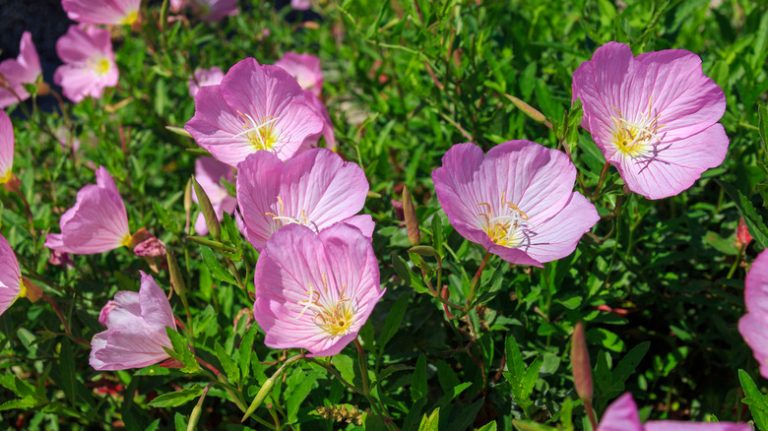Chrysanthemums contain a group of natural compounds called pyrethrins: pyrethrin I and II, cinerin I and II, and jasmolin I and II, more specifically. These compounds have the ability to repel and even kill insects and other pesky critters while remaining relatively safe to use around birds, humans, and other mammals. For centuries, chrysanthemums have been grown and harvested for use as a natural means of pest control. Ancient Chinese people discovered that when the heads of chrysanthemums were dried and ground, the resulting pyrethrum powder could be sprinkled almost anywhere to repel or even kill all sorts of creepy crawlies. For organic gardeners today, Chrysanthemums are still a powerful pest control option — and you don’t even have to pick and dry them to reap some of their benefits. When grown in the garden, chrysanthemum flowers can repel a range of pests, including hard-bodied insects, arachnids, flies, tiny mites, and more.
Pyrethrins work by over-exciting the nervous systems of insects, paralyzing them. But even if they don’t absorb the pyrethrin, the scent of fresh chrysanthemums alone is enough to keep many pests at bay. If you’re dealing with pests in your garden, consider planting a healthy clump of chrysanthemum flowers to defend your precious plants against these common garden invaders.
1. Ants

If you’re looking for a way to ant-proof your yard and protect your garden from ants before the spring and summer seasons arrive, planting chrysanthemums could be the key. Ants aren’t likely to take up residence anywhere near your chrysanthemum beds because they dislike the plant’s strong fragrance. Unlike commercial ant killers, chrysanthemums are generally safe to use around children and dogs, so there’s no need to wait for any poison to dissipate before going outside to play.
2. Spiders
If you’re tired of being spooked or even bitten by spiders in the garden, you can solve your spider problems with this stunning fall flower. Like ants, spiders tend to avoid chrysanthemums because of their strong smell, but spiders can also “taste” their surroundings through specialized organs on their legs. These delicate sensory organs will make spiders extra keen to get away from any chrysanthemums you have planted around your home.
3. Ticks
Erik Karits/Shutterstock
Ticks aren’t insects; they’re actually arachnids. Spiders tend to hunt or ambush their prey, while ticks wait for animals (or humans) to brush up against plants so they can hop on and draw blood. For this reason, Chrysanthemums are a good garden plant to grow near sidewalks or other pathways where unsuspecting people tend to brush up against wild grass, as the pyrethrin will repel and kill ticks in much the same way as spiders. You can also carry chrysanthemums in your pockets or sprinkle homemade pyrethrum powder on your clothes to repel any potential tick hitchhikers.
4. Roaches
pittaya/Shutterstock
Roaches aren’t super common garden pests, as they tend to prefer living closely with humans and feeding on crumbs and food waste. However, they can nest around garden sheds, garages, compost piles, firewood stacks, and other damp, warm places in your yard and eventually find their way inside your home. Planting chrysanthemums may help to repel cockroaches because pyrethrin will paralyze them. You can also grow chrysanthemums in pots near your doors, windows, and other entry points to discourage roaches from entering your house.
5. Mosquitoes
Oxford Scientific/Getty Images
Mosquitoes aren’t necessarily bad for your garden, but no gardener wants to battle a swarm while they’re tending to their plants. Pyrethrins in chrysanthemums are toxic to mosquitoes, but even the mere presence of these flowers may lighten your mosquito burden in the summer. Mosquitoes tend to avoid strong-smelling plants, which is why citronella and catnip are often touted as effective repellants. Chrysanthemums contain similar scents and oils that mosquitoes can’t stand, plus their pyrethrin ensures that any bugs still brave enough will meet a quick end.
6. Thrips
Zul_khairi90/Shutterstock
Most garden pests will die if exposed to chrysanthemums, but against thrips, these flowers work differently. Chrysanthemums won’t kill thrips, but they make extremely enticing “trap” plants, which is why they’re often used in the gardening nursery industry to lure thrips away from other plants. If you frequently deal with thrips in your garden, it may be a good idea to plant chrysanthemums around the edges of your yard to attract them away from your prized produce.
7. Moths
SULINDRA ALIAYUB/Shutterstock
Moths aren’t always a huge threat to the garden, but their larvae can be. Pyrethrins found in chrysanthemums will kill moths so they can’t lay eggs that will eventually hatch and munch on your precious garden plants. You can also dry and crush the flower heads to create a moth-repelling powder. Chrysanthemum is so effective that it’s often used in sprays for killing and preventing moths in closets, carpets, and more!
8. Flies
nechaevkon/Shutterstock
Next time you’re having a backyard picnic, bring a pot of chrysanthemums to the table. Like moths, adult flies can be somewhat beneficial for pollinating a garden, but their larvae can damage crops, and adults may also spread diseases between plants — and humans. Chrysanthemum is very effective at repelling flies from unwanted areas with its strong scent and pyrethrin content. If you keep livestock or chickens, extracts from chrysanthemums can also be used around their shelters to protect them from biting flies.
9. Mice

IrinaK/Shutterstock
Mice might be cute, but they can be a nuisance when they start nibbling on all your garden produce or invading your home. Not to mention, mice spread a range of dangerous diseases and leave behind nasty droppings. Chrysanthemum flowers have low toxicity levels when it comes to birds and most mammals, so they can be a good option for how to get rid of mice humanely. These flowers have a strong smell that repels mice, but if they take a nibble anyway, chrysanthemums can also cause nausea and vomiting, so they’ll think twice before eating from your garden again!


